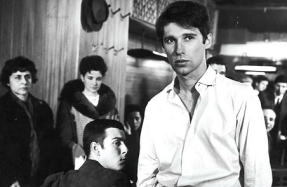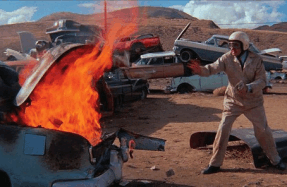
Where for many filmmakers the pandemic discouraged production or curbed creativity, it only seems to have inspired Radu Jude. Always impossible to peg, the prolific 46-year-old Romanian director has grown especially wily and provocative in recent years, embarking on a new phase in his career in which contemporary image culture and the sociopolitical absurdities of our time have become both subject of meticulous analysis and object of equally attentive ridicule. Like his Golden Bear–winning Bad Luck Banging or Loony Porn (2021), Jude’s latest, Do Not Expect Too Much from the End of the World, which recently won the Special Jury Prize at the Locarno Film Festival, feels like it has burst spontaneously from the global unconscious, a space where the real and the virtual mingle with increasing consent.
Miles away from his late-2000s origins as part of the Romanian New Wave, Jude is today working in a register closer to anarchic satire or essayistic fiction, which itself is far removed from his playing with the form of the Western with Aferim! (2015), his dalliance with the period piece in Scarred Hearts (2016), or his ongoing investigation of Romania’s checkered history in the archival documentaries The Dead Nation (2017) and The Exit of the Trains (2020). If something broke in people’s brains during COVID due to the enforced isolation and attendant rise in social media discourse, fear-mongering, and fascism, Jude’s recent films reflect this break in both form and content, assuming a bricolage aesthetic in which a dialectic of themes and ideas freely interfaces across a diverse spectrum of storytelling modes and imagemaking traditions.
Centred on issues of labour in the era of the gig economy, the ruthlessly funny Do Not Expect Too Much from the End of the World is told in two parts. The first follows Angela (Ilinca Manolache), an overworked production assistant tasked with filming casting interviews with injured factory workers for a work-safety video commissioned by an Austrian corporation, whose marketing director is, naturally, Goethe’s great-great granddaughter (and played by Nina Hoss). Filmed in 16mm black and white, this section—set over one day and, at 125 minutes, the far lengthier of the two chapters—at times resembles a city-bound road movie, a likeness Jude underscores through the shrewd incorporation of footage from Lucian Bratu’s 1981 colour feature Angela Moves On, a Ceaușescu-era production about the life of a female taxi driver that Jude juxtaposes with similar scenes of his protagonist driving around Bucharest. Whereas Bratu’s Angela is a helpless romantic, Jude’s is a hardened cynic. Zipping between interviews, she blasts Romanian turbo-folk (sample lyric: “Give me that money/Show me that money”), gripes about her boss on the phone, furiously downs energy drinks, and deflects sexist comments from other drivers; at one point, between meetings, she picks up her mom so they can relocate her grandmother’s remains before a construction company digs up the cemetery. In Angela’s world, there is literally no such thing as free time: everything can be monetized. In the film’s most brilliant running gag, Angela adopts an online edgelord alter ego à la Andrew Tate. With her identity hidden behind a face app, she spews hate speech and vulgarities across social media, seemingly to find release from the pressures and microaggressions of the workaday grind, but also probably to make a little coin. (In a fun moment set on a studio lot, German director Uwe Boll, playing himself, takes a break from filming a giant killer bug movie to make a video with Angela and take a few shots at his critics.)
As night falls and Angela’s (1895).






